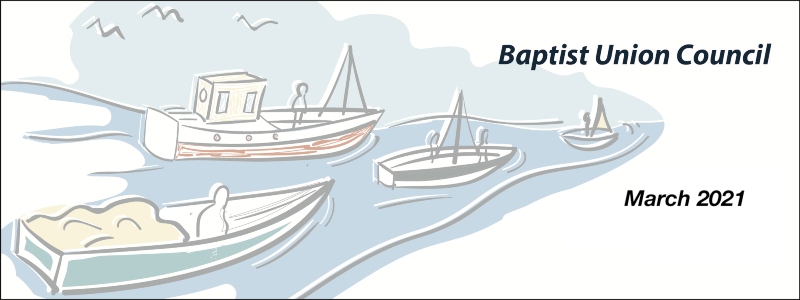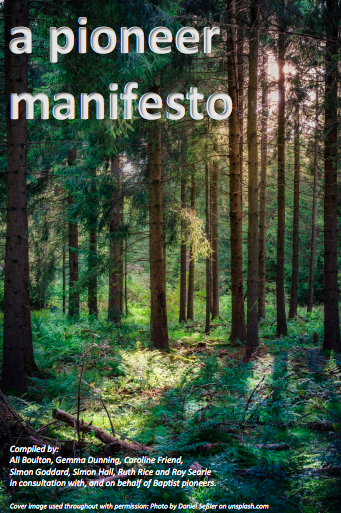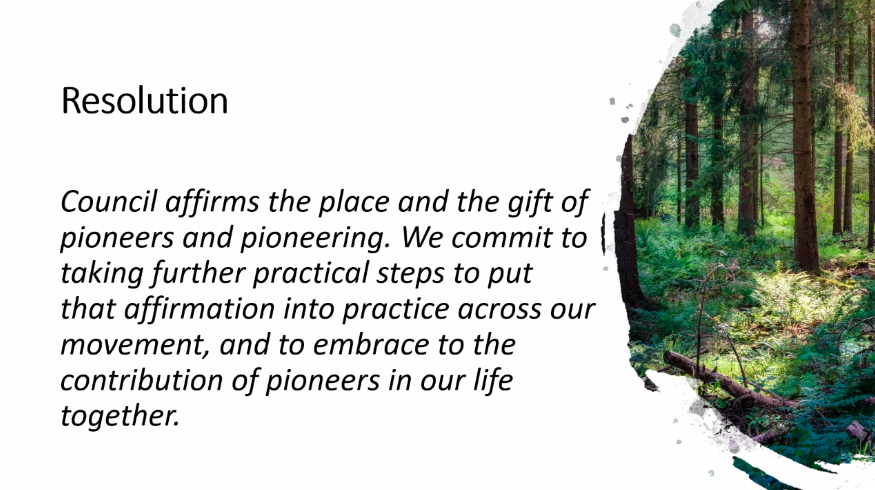Baptist Union Council: March 2021
Pioneering and divestment were a key focus at the latest Baptist Union Council, the second to take place solely using video conferencing technology.
More than 80 participants gathered on Zoom across two days (23-24 March) for the gathering, which was also signed in BSL.
Council members affirmed a resolution relating to exploring ways of further supporting pioneering across our movement, as well as overwhelmingly voting in favour of divestment.
They approved changes to Ministerial Recognition rules relating to a request to make equality and diversity training mandatory, and heard the first report of a group exploring funding for ministerial training.
Worship over the two days was led by Linda Hopkins, minister of Waterloo United Free Church. Linda joined Lynn Green to lead the live prayer broadcast on Wednesday evening.

Scroll down for the following reports:
-
Pioneering
-
Divestment
-
The Funding for Ministerial Training Working Group
-
Changes to ministerial recognition rules
-
Finance and Pensions
-
Spending review
-
New member churches and closures
-
Key Roles Nominations
-
Farewell to Council moderator David Mayne
Pioneering
The Baptists Together Pioneer Ambassadors Simon Goddard, Ali Boulton and Roy Searle led sessions on both Tuesday and Wednesday. The aim was to offer and commend the Pioneer Manifesto, written in consultation with and on behalf of Baptist pioneers. Planting more churches and pioneering in new ways is one of our four key areas of work as Baptists Together (alongside equipping our existing local churches for mission; investing in Godly leadership; and enabling Baptist voices and action in the public square.)
 The Pioneer Manifesto before Council was due to have been brought to the March 2020 gathering, but that gathering’s cancellation had resulted in the Manifesto being refined. It was also made clear it doesn’t represent all strands of pioneering.
The Pioneer Manifesto before Council was due to have been brought to the March 2020 gathering, but that gathering’s cancellation had resulted in the Manifesto being refined. It was also made clear it doesn’t represent all strands of pioneering.
The Manifesto sets out ‘a hopeful vision for the shared life of our Baptist family, with some observations about the challenges that are currently hindering us in fulfilling that vision.'
‘The desire is that we can engage in a strategic conversation about how to overcome these obstacles, and as Baptists Together renew our commitment to the journey of transformation that is necessary,' it stated.
Areas highlighted in the Manifesto included building greater support, understanding and connection for pioneers. It includes several recommendations. These offer a number of topics for discussion amongst our regional and specialist teams, but it is hoped it will also stimulate discussion in local churches. For example, the following questions might be helpfully considered:
• What is God doing?
• Where is it emerging?
• Who has a passion for it?
• How can we get behind them?
Ali explained that church attendance is now measured at just five per cent of the population. Pioneers are found in the midst of the other 95 per cent. One key difference is that it is incarnational, not attractional - seeing what emerges when you plant the gospel, not a church.
Ali said that God is birthing new life among us, which doesn’t necessarily look like church, but does look like the body of Christ. She asked how can we nurture and protect this fragile new life and allow it to grow to maturity? Council members heard that some pioneers who began as Baptists have moved to other denominations to be recognised.
Roy said that given pioneering is one of our denomination’s priorities, it had been felt it needed a narrative to help shape our understanding and provide a way forward for us as a movement. The Parable of the Forest provides such a narrative – an eco system rich in diversity and history that nurtures new growth, where old and new are both valued. For more, watch this video.
Simon acknowledged that the word pioneering can be used in negative ways, particular with its colonial connotations. He stressed that pioneers are not the first in a community – they are following Jesus – and when they do 'we realise that God is already there.' Alternatives had been sought, but the language of pioneering has stuck.
Several Baptist pioneers joined Council for the sessions to share their experiences and lead conversations in breakout rooms. A video featuring short introductions from Baptist pioneers across the country was shown, showing the breadth of pioneering taking place.
During feedback, it was stressed that Associations are wholeheartedly committed to new forms of church, and through the Ignite Report and
Marks of Ministry, we are recognising how the Spirit is increasingly calling different people to different types of ministry.
Ali replied that the Pioneer Manifesto is celebrating what the Baptist family has done – but is asking: “Can we do more?”

Council members were asked to affirm the following resolution:
‘Council affirms the place and gift of pioneers and pioneering. We commit to taking further practical steps to put that affirmation into practice across our movement, and to embrace the contribution of pioneers in our life together.’
It was overwhelmingly passed, with one no and four abstentions.
A Pioneer ‘Round Table’ is being established, convened by the three Pioneer Ambassadors, which includes a ‘Pioneer Advocate’ from each Association. The Round Table has a representative on Mission Forum.
The ‘Round Table’ would be able to identify common challenges, engaging strategically to address these, as well as celebrating what is working well and helping to share good practice across the country.
Join the conversation: #parableoftheforest @BaptistPioneers Watch the ‘Parable of the Forest’ video at: http://bit.ly/parableoftheforest
Divestment
Baptist Union Council members overwhelmingly passed a resolution to fully divest from fossil fuels. The Baptist Union had previously already divested from Coal and Tar Sands following
a Council resolution in March 2019. This update to the
Baptist Union Ethical Investment Policy reflects a commitment to respond to the continuing environmental and climate crisis by abstaining from investment of funds in all fossil fuel extraction, refining and distribution.
The proposal had been brought to Council by the Revd Dr Dave Gregory, Convenor of the Baptist Union’s Environmental Network, and was co-authored by John Levick, the Baptist Union’s Treasurer, as a practical commitment towards climate justice ahead of the COP26 United Nations climate conference in Glasgow in November.
In presenting the resolution Dave explained how much had changed in the two years since the issue had last come before Council. The direct action by Extinction Rebellion and school strikes by children and young people had rapidly raised the profile of the environmental and climate crisis. Atmospheric levels of carbon dioxide from fossil fuel use have continued to rise, and 2020 was in the top 10 warmest years on record.
Investment of Baptist Union funds has not remained static. In line with the current ethical policy, the Baptist Union no longer holds any tar sands or coal stocks, and beyond it has no holdings in oil companies. Proactive action has also been taken to invest funds in renewable energy, for example the Foresight Solar Fund and Lombard Odier Global Climate Bond. Our investment manager Cazenove has a strong environmental emphasis.
Considering these developments, Dave said, embedding this investment trajectory formally into our ethical investment policy to cover all forms of fossil fuel extraction and distribution would bringing greater alignment with the Baptist Together movement’s vision of “growing healthy churches in relationship for God’s mission”.
He added that taking this step at this moment ‘enables us to walk more firmly with our partners in the gospel in light of the climate crisis which affects the whole ‘community of creation’, both human and others, across the world today and threatens the order of creation into the future.’ It would also be a significant step along the path to reaching zero net carbon as a movement, as well as giving Baptists a stronger voice in encouraging others in our nation and world to rise to the challenge of the climate crisis through this coming decade.
Lucy Tiller, intern for the Joint Public Issues Team, spoke movingly to the resolution, emphasising that climate justice was an issue on which many young people agreed. ‘Today I’m asking you to use your financial resources and your moral leadership to stand alongside young people and groups already affected by climate chaos,’ she said.
Following the presentations many council members spoke passionately in support of divestment. Several highlighted how churches in their Associations had asked them to support the motion. A number of Baptist churches have already divested, including Devonport Baptist Church in Plymouth and High Street Baptist Church in Tring.

The complexity of energy security was highlighted, but the resolution nevertheless passed with a 98.5 per cent majority. The updated wording to the Baptist Union investment policy now reads: ‘We will therefore avoid investment in companies with significant trading in: the extraction, production and refining of oil, gas, tar sand and coal.’
After the vote, Dave, a former meteorologist at the Met office and the European Weather Centre, said, ‘It was inspiring to hear so many voices from across the generations and different parts of the Baptist Together family recognising the importance of the decision to divest from fossil fuels, and agreeing that this was the way we need to walk with Jesus together in the face of the climate and environmental crisis which for many in our world is an immediate climate emergency.’
The Funding for Ministerial Training Working Group
The Funding for Ministerial Training Working Group presented its first report to Council.
Council members approved the creation of the group at the November 2019 meeting, which saw a large focus on how ministerial formation is funded.
The group has met four times and the report showed the areas it has discussed so far.
Much of the paper was around the costs and shape of ministry training, group chair Ian Bunce explained. He said the bad news is that ‘we have discovered what we all knew: there is no pot of gold or money tree within the grounds of Baptist House.’
What the group hasn’t yet discovered is ‘the level of commitment to the formation and training of future pastors and ministers.’
He said the group believes investing in training is both vital for the health of our Union ‘but also for those invested in, for it gives them a stronger sense of belonging and commitment to Baptists Together for the long haul.’
But to release funding ‘would mean that as Baptists Together we see this as a high importance, over and above, or alongside competing calls upon our limited resources.’
The paper explained there are many who are unable to pursue a calling within the Baptist community due to a lack of resources. One particular issue is that men and women are often beginning training as a second vocation after a first career and hearing God’s call. They are unable to access student loans if they had already taken one during a first degree.
The group reflected on the role of Baptist colleges – formation offers a Baptist context in a way that training and formation in other contexts cannot do and ‘offers the Baptist family its best shot at forming ministers for mission in Baptist churches who will have a strong sense of Baptist identity, of our networks and obligations.’
One of the issues that has come to the fore is that in many parts of our Union, the importance of Baptist training is ‘not taken seriously’, the group has found. This is because many churches do not send anyone off to train.
The group had also reflected on the particular challenges faced by women training for Baptist ministry, based on feedback from Centenary Enabler Jane Day and other ministers, and the challenges for funding pioneering, particularly when not connected to an established church. This has led to some pioneers with roots in the Baptist family to train for ministry with other denominations, notably the Church of England - a point underlined in the sessions directly focused on pioneering.
Possible ways forward presented in the report are for the establishment of a national Baptist Training Fund and working with partners to create an alternative loan scheme. More broadly we need to decide on the importance of training for future ministers, pastors and pioneers within the Baptists Together family.
In a feedback session following the presentation of the report, members affirmed the vital role of Baptist colleges, but also the need to raise up leaders in different ways.
Ian said the group had only just begun to understand and develop this work and there is still a journey to travel.
‘As one team looking at the present and future of our Union, it seems to the group that it is vital that we find ways of investing in the training and formation of ministers for the next generation.’
He asked members if they wanted the group to continue the journey that was set out pre-pandemic. Moderator David Mayne replied there was no lack of appetite for the group to continue, affirmed what had been presented so far, and looked forward to further reports.
Changes to ministerial recognition rules
Council members approved changes to two sections of the Ministerial Recognition rules, which relate to a request to make equality and diversity training mandatory.
That request came in a letter to the Ministries Team signed by around 250 people, including 170 Baptist ministers, in the summer in the wake of discussions among Baptists on social media following the murder of George Floyd.
‘Sadly, those conversations were not always conducted with the grace and humility that we anticipate of those called to lead God’s people within Baptists Together, leaving BAME brothers and sisters in Christ feeling that their experience of individual and systematic racism had not been heard,’ wrote Ministries Team Leader Andy Hughes in his Council report. ‘There are many within our movement who have been greatly saddened by these responses and consequently wrote asking that we take this opportunity to address these issues of justice.’
The letter asked for two specific actions:
-
That the Ministries Team makes equality, diversity and unconscious bias training a compulsory part of both initial Ministerial Formation and Continuing Ministerial Development. Priority should be given to those Ministers who did not receive such training as part of their initial Ministerial Formation.
-
That the list of examples of Serious Fault in the Ministerial Recognition Rules include discriminatory language, and of Gross Misconduct include discriminatory behaviour.
Andy said he wrote to all ministers following this letter, inviting further responses, and explaining that Baptist Colleges have for many years included equality and diversity training, but are committed to doing all they can to bring about change.
An extraordinary meeting of the Ministerial Recognition Committee subsequently took place in November to consider the requests and the feedback.
The responses from ministers broadly fell into 3 groups.
-
Strongly welcoming the response.
-
Responding positively on the issue of racial justice but very concerned that this may then lead to a requirement to accept a prescribed line on gender and human sexuality issues where different positions are currently held.
-
A strong reaction against racial justice training being required or additions made to the MR Rules. The concern raised by several ministers was that behind the Black Lives Matters movement lie political ideologies which they consider to be contrary to scripture. There were also concerns raised over the perceived importation of an American understanding of racial discrimination into a significantly different context within the UK.
Andy said the MRC recognised ‘the clear tension between those who would like the Union through the MRC to be more prescriptive and those who would strongly argue that they should be free to hold their theological convictions without any interference or correction.’
MRC can update appendices to the MR Rules, so was able to make the required changes to the Serious Fault and Gross Misconduct wording.
Changes to the main MR document require the approval of Council. Andy explained that the two suggested changes would empower MRC to determine what training is required.
The first suggestion was the inclusion in Section 4 of the following line:
‘All ministers on the Register in categories 1-4 must undertake equality and diversity training at regular intervals. The training requirements will be determined by the MRC.’
Section 7 on page 7 determines the circumstances where ‘the name of a Minister shall be removed from the Register’. The second part of the proposal was to replace bullet point 5 which read ‘The Minister fails or refuses to undertake safeguarding training as required by the MRC’ with:
‘The Minister fails or refuses to undertake safeguarding training and / or equality and diversity training as required by the MRC.’
The proposals were overwhelmingly approved, with two abstentions. Andy said MRC will now work with our justice groups on the detail.
Finance and pensions update
Richard Wilson, Support Services Team Leader, gave a finance and pensions update on Wednesday morning. The final quarter of the year proved to be difficult financially for Baptists Together, with the November lockdown likely having an impact on our churches and subsequent Home Mission giving. Having been on track to match 2019 through the summer, the Home Mission Appeal fell short by £75k.
There were also significant shortfalls in income compared to the forecast made based on the September results in Legacies, Baptist Union Corporation (BUC) Income, Subscriptions and Investments.
The end result for 2020 does pose a question as to whether the budget for 2021 is realistic, Richard said, given that it was based on information prior to the final quarter. However, his current view is that overall, it is:
the issues in the final quarter of 2020 should not repeat directly, but significant risk remains, particularly on legacies. He added that part of our challenge is in communication to churches the benefits of what we do.
Richard said the Pension Scheme is performing relatively well. The deficit is £6m, rather than the £12m in the plan at this stage. (It was around £93m in 2017). We remain some years from buy out, which will eliminate the risk, but as more people retire the cost of the scheme becomes cheaper to insure. It is hoped that the majority of employer debt issues – cessation events – will be resolved this year. ‘Broadly the pension scheme is in good news territory,’ said Richard.
Spending review
Council members were presented with a paper that outlined a possible review to how we distribute our funds. The need for such a review had been highlighted by Richard Wilson at the previous Council in October.
His paper explained that the model for distributing funds from the Home Mission fund has been in place since soon after the Futures Review (2013). It has been tweaked since but is fundamentally the same. ‘While the system is not fundamentally broken, there are continued tensions about whether the current system is equitable,’ the paper stated.
Both Trustees and the Core Leadership Team had now discussed a review, said Richard – and there was a consensus that it needs to happen.
His paper suggested a phased approach for the review – an initial phase of diagnosis to gain a clear understanding of the current situation which would involve listening to all the key stakeholders; then a phase to develop options; a phase of refinement and agreement; then an implementation phase. BUGB Trustees have agreed to fund external, independent support for the first phase.
New member churches and closures
Council members were told of four churches which have joined our Union. These are:
-
Breathe Communities Penzance (SWBA)
-
Cabin Lane Church (HEBA)
-
The Meeting Place – Westbourne (SCBA)
-
Strood Gospel Mission Church (SEBA)
There was a change of association for Romford Baptist Church (from EBA to LBA), an amalgamation - Florence Road Baptist Church and Gloucester Place Baptist Church, to form One Church Brighton (SEBA).
Council members were also informed that Speke Baptist Church had ceased membership of our Union. Phil Jump, Regional Minister Team Leader of North Western Baptist Association, explained that while the church was in good relationship with the Association, it had become very engaged with The Fellowship of Independent Evangelical Churches and was ready to make the move.
Council members were also informed of the following closures:
-
Farm Road Baptist Church, (LBA)
-
Cross Street Baptist Church, Arnold (EMBA)
-
Cholsey Free Church (SCBA)
-
Aberdare Baptist Chapel (East Glamorgan Welsh)
-
Stoke Poges Free Church (SCBA)
-
King Street Baptist Church, Abertillery (South Wales)
Moderator David Mayne gave thanks and prayed for each church.
Baptists Together Key Roles Nominations
Rupert Lazar, moderator of the
Key Roles Nominations Team, brought a number of recommendations to Council, all of which were supported.
-
The Revd Philip Lutterodt, the Revd Philip McCormack and Mr Mark Spriggs to continue a second term of three years as trustees
-
Ms Yvonne Downie, the Revd Craig Millward, and the Revd Osoba Otaigbe to serve as Council Co-optees for three years
The Team acknowledged with thanks the service of the Revd Martin Hobgen who was first co-opted in September 2013.
Rupert mentioned that we are continuing to seek a new moderator of the Trustee Board, with current moderator Alastair Mitchell-Baker finishing in August. 'Give this appointment your urgent attention,' he told Council members. 'You recognise the importance significance of this role. As yet no one has come forward – we would really like to bring this to your attention and prayer – as it demands it.'
We are also seeking a successor in good time to treasurer John Levick, who finishes in May 2023.
Farewell to moderator David Mayne
This was the last Council to be moderated by David Mayne, who will come to the end of his second, three year term in August.
In thanking David for his service, General Secretary Lynn Green praised the ‘calm, wise and welcoming’ way he had drawn people in, as well as highlighting his attention to detail and prayerful preparation.
'The Lord provides the right people for different seasons, and you’ve been the right person for this season,’ Lynn said.
'You’ve really helped us make some significant steps on our journey of transformation. You’ve helped us discern some sensitive issues, helping us hear each other and the Spirit. You have served us so well, and have really blessed us.’
David, minister of Shoeburyness and Thorpe Bay Baptist Church in Southend, said it had been a 'privilege' to serve in the role, through which he had met some wonderful people.
Baptist Times, 31/03/2021